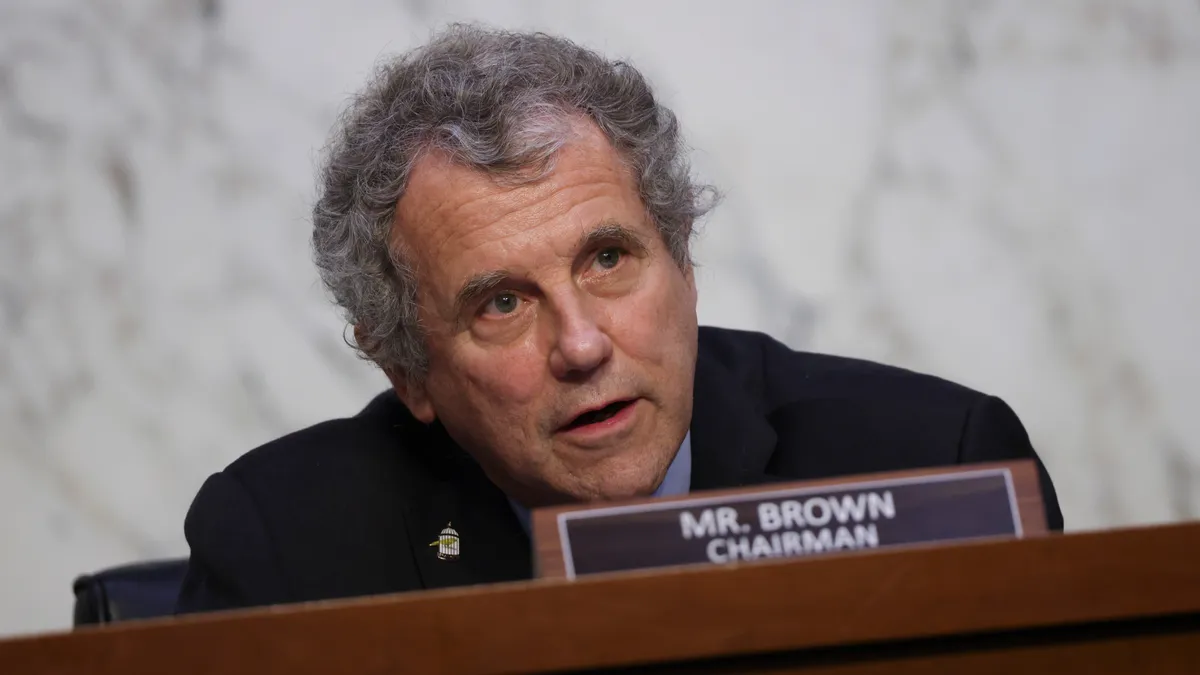Dive Brief:
- Four Democratic senators are asking the Federal Reserve to overhaul its approach to big-bank mergers, saying a revamp is critical given the spate of regional bank failures this year.
- The group, which includes Sens. Sherrod Brown, D-OH; Elizabeth Warren, D-MA; Jack Reed, D-RI; and John Fetterman, D-PA, said the central bank should reconsider its policy regarding large bank M&A, as well as its framework for evaluating a merger’s impact on financial stability.
- In the letter, the senators accused the central bank of continuing to approve mergers under an “old rubric” that they claim doesn’t reflect market realities.
Dive Insight:
A provision in the Dodd-Frank Act includes an amendment to the Bank Merger Act, which mandated federal banking regulators consider financial stability in evaluating bank mergers.
The Fed’s application of the financial stability factor, however, has not been rigorous enough, the senators said.
“In the past, Federal Reserve orders approving mergers have contained cursory analysis and reasoning to support the determination that such mergers would not result in greater financial stability risks,” they wrote.
The lawmakers said they are also concerned that the central bank has not issued any rules or guidance indicating the types of bank mergers that would implicate financial stability concerns.
The lawmakers noted the Fed’s June 2021 approval of Silicon Valley Bank’s acquisition of Boston Private, in which the central bank said the resulting organization would not pose significant risk to the financial system in the event of financial distress.
“Yet less than two years later, in conjunction with the failures of SVB and Signature Bank, the Federal Reserve invoked the systemic risk exception to ‘reduce stress across the financial system’ and ‘support financial stability,’” they wrote. “While rapid growth and poor risk management contributed to SVB’s ultimate failure, the lack of any financial stability analysis in the prior merger approval demonstrates that the Federal Reserve needs a more thoughtful way to consider and explain a merger’s risk to financial stability.”
The lawmakers also expressed concern about the assumption of failed bank assets by other banks, highlighting how JPMorgan Chase, the nation’s largest bank, became even larger after its acquisition of failed First Republic Bank in May.
While such measures are necessary to maintain public confidence in the banking system in the wake of a bank failure, they can also increase the financial stability risk of the acquiring banks, the senators said.
The letter comes as several agencies have signaled they are taking a closer look at how they evaluate and approve bank mergers.
The Justice Department in June said it is expanding its scrutiny of bank mergers to include a broader scope of factors such as fees, interest rates and customer service.
Speaking at a Brookings Institution event, Jonathan Kanter, the DOJ’s assistant attorney general for antitrust, said the department’s bank merger review process will take into account concentration levels across a wide range of metrics beyond bank deposits and branch overlap.
Meanwhile, the acting chief of the Office of the Comptroller of the Currency said last year his agency is working with the DOJ and fellow bank regulators to review its own merger framework.
Acting Comptroller Michael Hsu told attendees of a virtual Brookings Institution event that the OCC is weighing how it can incorporate public input amid merger proposals.
“It is time to rethink how we analyze bank mergers,” he said.














